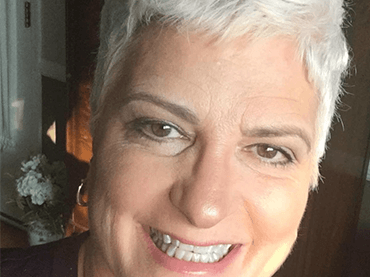Meet Nancy Michaelian
Nancy Michaelian is no stranger to the world of medicine. The long-time nurse and UPMC employee has spent most of her life caring for others not far from her home in Harrisburg – but in 2010, she was the one who needed care.
“I went in for a routine mammogram and ended up getting a biopsy,” Nancy recalls.
Cancerous tissue was discovered in Nancy’s right breast. She had a lumpectomy to have it removed, followed by radiation.
Nancy spent the next five years returning for mammograms every six months, and by 2016, she only needed them annually. But in February of 2017, doctors noticed a suspicious spot behind an old scar.
“I had a sub clavicular lymph node on my left side, which was a problem because in 2010, the cancer was in my right breast,” Nancy explains. “Movement like that means a stage 4 diagnosis.”
Time for Treatment
Nancy was faced with a difficult decision – scheduling a double mastectomy to have her breasts removed. But the then-57-year-old knew what needed to be done.
“I am not my breasts,” Nancy says. “I was done with breastfeeding, and they had served their purpose. Not having breasts doesn’t make me any less of a woman or person.”
She had the surgery at UPMC Community Osteopathic in June of 2017 and began the road to recovery. After about eight weeks, Nancy was happy to return to her nursing job, but what started as a light-hearted interaction with a patient on her first day back quickly took a serious turn.
“I was showing him how we use a pulse oximeter to measure blood oxygen levels,” Nancy recalls. “When I slipped it on my finger and saw my heart rate was elevated, my colleagues told me I needed to go to the emergency room.”
The wound where Nancy’s right breast had been removed was not fully healed, and a minimal amount of fluid was still leaking from that area. An additional incision would be required, followed by vacuum-assisted closure.
Nancy’s doctors also recommended an advanced treatment known as hyperbaric oxygen therapy (HBOT).
Hyperbaric Oxygen Therapy
HBOT is offered by UPMC Wound Healing Services at 14 locations across Pennsylvania and Western Maryland, including UPMC Community Osteopathic, where Nancy returned for her therapy.
During HBOT, patients lie inside of a clear chamber while receiving high amounts of oxygen. Blood carries this oxygen to tissues throughout the body, stimulating stem cells and ultimately leading to wound healing.
“They call each session a ‘dive’ because when the pressure in the chamber increases, it’s like a diver going underwater,” Nancy explains. “I didn’t feel anything, just laid there, watched TV, and knew I could use the intercom if I needed anything.”
Nancy recalls “resurfacing” at the end of each “dive” when the chamber was slowly depressurized. Over the course of five weeks, she underwent a total of 24 HBOT sessions, each lasting about two hours and 10 minutes. She’s thankful this unique form of care exists and was presented to her as an option.
“I have great faith in the system at UPMC. I trusted my doctors and had no issues. They told me what I needed to do to heal. So, that’s what I did.”
“Living in the Now”
Nancy still works with patients – though she has transitioned into a role where she performs pre-admission testing and records medical histories over the phone. Nancy enjoys being able to share her personal experience with anyone going through a situation similar to hers.
She has also made sure to leave plenty of time for fun, especially travel.
“I’ve sailed the great rivers of Europe, spent two weeks in Bali, been to Italy for 12 days, and took a trip to Belize,” Nancy says. “I’m not waiting until I retire. I feel fine, but I’m not taking anything for granted.”
Nancy values the time she gets to spend with her four children and seven grandchildren. Her husband passed away in 2011, and she says that experience, along with her past health concerns and treatment journey, have had a lasting impact on her outlook, which she calls “living in the now.”
“Everybody knows our time on Earth is limited. The word ‘cancer’ was scary to me. I’ve had it twice and have become very aware of how I live my life.”
Nancy’s treatment and results may not be representative of all similar cases.

















